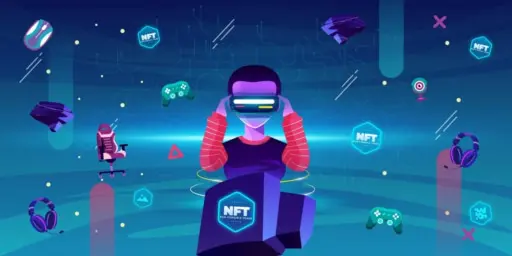Blockchain: The Foundation of the Metaverse
Eduard Rosicart
- marzo 13, 2024
- 5 min read

Blockchain technology is critical to realizing the full potential of the metaverse. By enabling decentralized control, digital asset ownership, and transparent record-keeping, blockchain provides the infrastructure for powering metaverse economies, governance, security and user privacy.
What is the Virtual Economy?
Virtual Economy refers to the digital world where transactions and commerce take place in a virtual environment. It is a space where users can buy, sell, and trade virtual assets such as nft (Non-Fungible Tokens) within the metaverse. The metaverse is essentially a digital space built on the ethereum blockchain, allowing users to interact and engage with others in a virtual space. The use of blockchain technology within the metaverse is still a relatively new concept but has enabled the development of metaverse projects and platforms.
Blockchain is the key technology that makes the metaverse work, as it enables secure transactions and the creation of a decentralized metaverse ecosystem. Blockchain and crypto play a crucial role in the metaverse development, as they allow users to own and trade digital assets securely. The crypto metaverse is part of the metaverse ecosystem, with blockchain-based metaverse platforms creating a seamless and immersive virtual experience. The future of the metaverse is intertwined with blockchain and crypto, as they enable new possibilities and opportunities for users within the metaverse. The metaverse in blockchain and blockchain in the metaverse are shaping the way we interact and engage in virtual spaces.
Metaverse and Blockchain: perfect pair
Metaverse and blockchain are the perfect pair, with blockchain technology providing a crucial backbone for the development and operation of virtual worlds. The metaverse being developed relies on the immutability of blockchain to ensure secure transactions and interactions between users and the virtual environment.
Many blockchain-based metaverse platforms are leveraging blockchain networks, such as polygon blockchain, to enable metaverse interoperability and seamless experiences for users. Features like metaverse blockchain gaming allow users to earn digital assets that are recorded on the blockchain and stored securely in the blockchain infrastructure provided by blockchain. The integration of blockchain and the metaverse is essential for the future of virtual worlds, as the metaverse must rely on the trust and transparency of blockchain technology to thrive.
Enabling the Metaverse Virtual Economy
Blockchain allows true digital ownership and transfer of value in the metaverse. Major use cases include:
-
Digital currencies like Bitcoin and Ethereum enable seamless payments for virtual goods and services. Cryptocurrencies allow for pseudo-anonymous peer-to-peer transactions without intermediaries.
-
Non-fungible tokens (NFTs) confirm permanent ownership of unique digital assets like artwork, virtual real estate, avatars, wearables and more. NFTs create digital scarcity and value.
-
Smart contracts automate complex financial transactions and agreements between metaverse users, creators, platforms, and applications. This eliminates manual processes and overhead.
This decentralized approach liberates economic activity that’s persistent between virtual worlds and not bound to any single platform or company. Users retain control over their money, assets, and financial agency.
Facilitating Governance and Oversight
Blockchain further enables:
-
Decentralized governance via systems like decentralized autonomous organizations (DAOs), allowing metaverse participants to collectively manage worlds, codify rules, implement proposals and more.
-
Self-sovereign identity where users fully control their digital identities, data, and privacy without centralized authorities. This includes managing verified credentials that can be shared selectively.
-
Democratic decision-making on metaverse policies and changes through token-based voting and transparent proposal processes.
By distributing oversight to users through cryptography and consensus mechanisms, blockchain limits centralized control over the metaverse economy, culture, and evolution.
Bolstering Security and Trust
Blockchain boosts metaverse security by:
-
Preventing fraud via immutable, transparent transaction ledgers viewable to all participants. Invalid transactions can’t be faked.
-
Reducing data risks through cryptography, zero-knowledge proofs, and sophisticated access controls. Users control what data is shared.
-
Enabling multi-factor authentication for identity verification using digital wallets and biometric signatures.
-
Allowing account and asset recovery mechanisms for lost keys or compromised wallets via social recovery.
-
Building reputation systems and digital trusts between users with verifiable interaction histories. Bad actors can be penalized.
Blockchain’s distributed trust model establishes confidence in identity, assets, data exchange, and interactions across the open metaverse, vital given users’ heightened exposure in virtual worlds.
Bitcoin and cryptocurrencies are only an application of Blockchain
Bitcoin and cryptocurrencies are only an application of Blockchain. However, the potential of blockchain goes far beyond just financial transactions. The metaverse, a virtual reality space where users interact with each other and digital objects, is one area where blockchain can play a key role. Blockchain enables the creation of metaverse crypto projects and offers a secure platform for transactions within the metaverse. Users of the metaverse can earn metaverse tokens using blockchain, ensuring transparency and immutability of transactions. The future metaverse will likely heavily rely on blockchain platforms for various applications in the metaverse.
Blockchain is a fundamental feature of the metaverse, providing the necessary infrastructure for the secure exchange of digital assets and services. Cryptocurrencies in the metaverse are just one application of the greater potential that blockchain offers. Various applications of blockchain can be used in the metaverse, such as decentralized identity verification and digital ownership. The metaverse helps showcase how blockchain can revolutionize not only financial transactions but also the way digital interactions are conducted.
Driving Innovation and Growth
The transparent, permissionless nature of blockchain also promotes rapid innovation by creators and builders. Metaverse applications can interconnect while still retaining user ownership. Open standards drive collaboration.
By addressing vital issues like trust, identity, asset ownership, and economic incentives, blockchain serves as the foundation driving metaverse adoption. As blockchain matures in scalability, speed, and usability, so too will possibilities for economic, social and cultural decentralization. The building blocks are being laid today for the metaverse’s flourishing tomorrow.

